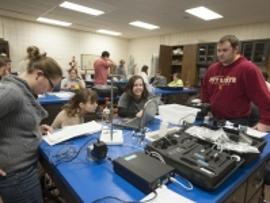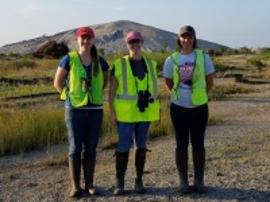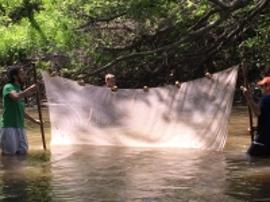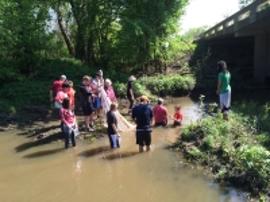Undergraduate Programs
In the Department of Biology at Pitt State, you may study from a variety of emphasis areas including pre-professional health and clinical laboratory sciences, cell and molecular biology and genetics, field biology and environment, ecology, and secondary education. See Biology Degrees and Programs for more information.
Pre-Professional Health, Clinical Laboratory Sciences, Cell and Molecular Biology
 The Department of Biology has excellent facilities and faculty for the preparation of students interested in professional health and laboratory science careers. Competition for entry into health-related professional schools is keen. A student must expect to have an outstanding academic record to gain admission to a professional school. PSU students have been successful at gaining entrance to professional schools and excel in the programs.
The Department of Biology has excellent facilities and faculty for the preparation of students interested in professional health and laboratory science careers. Competition for entry into health-related professional schools is keen. A student must expect to have an outstanding academic record to gain admission to a professional school. PSU students have been successful at gaining entrance to professional schools and excel in the programs.
Emphasis programs are available for students desiring to meet the requirements for entrance into medical, dental, optometry, veterinary, physical therapy, physician assistant, and cell and molecular biology. There is also a separate degree program in medical laboratory sciences.
Students in any area of pre-med, health, and laboratory science options can earn the Bachelor of Science degree in Biology. Students emphasizing medical laboratory sciences can earn the Bachelor of Science in Medical Laboratory Sciences which includes a fourth clinical year or earn the Bachelor of Science in Biology and do a clinical experience post-graduate.
The PSU Health Professions Handbook is also available for further information on health professions, including general information, application information, and a pre-med overview.
- Pre-Medical/Pre-Dental: preparation for entry into to medical schools (medical, osteopathic medicine, optometry, dental, veterinary) or graduate medical research programs
- Pre-Physical Therapy: preparation for entry into further specialization in physical therapy
- Cellular and Molecular Biology: preparation for graduate school or entry-level employment in biotechnology
- Medical Laboratory Sciences: preparation for clinical work in hospitals or private labs
The Pittsburg State University pre-medical/pre-dental/pre-veterinary/pre-optometry program allows students to pursue interests in pre-medicine (prepare for entry into medical, osteopathic, and dental schools or graduate medical research programs), pre-physical therapy (prepare for entry into further specialization in physical and occupational therapy), cell and molecular biology (prepare for graduate school or entry-level employment in biotechnology), and medical technology (prepare for employment in hospitals or private labs). Note: The department also offers pre-professional work in optometry and veterinary medicine.
See additional information on the Biology Degrees and Programs page.
Faculty in the Pre-Medical/Pre-Dental/Pre-Veterinary Medicine/Pre-Optometry Program
Peter A. Chung, Ph.D.
Professor of Microbiology
Department of Biology
Office: 303 Heckert-Wells Hall
Phone: 620-235-4736
Anuradha Ghosh, Ph.D.
Associate Professor of Environmental Health
Department of Biology
Office: 321 Heckert-Wells
Phone: 620-235-4532
Phillip A. Harries, Ph.D.
Professor of Molecular Biology
Department of Biology
Office: 222 Heckert-Wells Hall
Phone: 620-235-4864
Mandy M. Peak Bryan, Ph.D.
Professor of Biology
Department of Biology
Office: 203 Heckert-Wells Hall
Phone: 620-235-6541
Neal D. Schmidt, Pharm.D.
Instructional Professor
Department of Biology
Office: 304 Heckert-Wells Hall
Phone: 620-235-4737
Daniel M. Zurek, Ph.D.
Professor
Department of Biology
Office: 222 Heckert-Wells Hall
Phone: 620-235-4746
This is an online information and orientation source for students seeking information about Pre-Physical Therapy at PSU.
The Department of Biology program has a pre-professional program in physical therapy. The curriculum includes courses needed to qualify for a Bachelor of Science in Biology and those needed for admission into Physical Therapy Graduate Programs at other universities, including Kansas University and Wichita State University. Graduate PT programs require a Bachelor of Science degree, but not necessarily a biology degree. However, since there are many science requirements, it is difficult to get a non-biology degree in four years and still meet the PT course requirements.
PSU Pre-Physical Therapy Student Orientation Guide (PDF)
See additional information on the Biology Degrees and Programs page.
General Curriculum Information: Pre-Physical Therapy Curriculum
Students take the standard biology coursework, plus a minor in chemistry, psychology or physical science. A physical science Minor is "standard' with our Pre-PT curriculum. A normal course load is around 16-credit hours/semester and can be completed in four years. Freshmen will take one biology course plus one chemistry or physics course per semester and perhaps one summer to finish the degree in four years. The schedule is filled in with general education courses.
Transfer students entering as juniors will need to take two biology courses plus a chemistry or physics course per semester with most likely one summer to finish the degree in two years. This will be very busy for you since you are doubled-up on the science curriculum to finish on time. Keep in mind, mainly lower division courses are offered over the summer, so it may be to your advantage to take summer classes as a freshman or sophomore!
Biology Pre-Physical Therapy FAQ
1. How do I find out more about physical therapy careers?
Contact a physical therapist and ask about the job, plan a visit.
2. What courses do I take?
See the current catalog or, if you have earlier enrollments, the appropriate catalog.
3. Who is my advisor?
The Department of Biology will assign an advisor to you from those Biology faculty who advise pre-PT students. The information will also be available in GUS. Advisors are here for you and provide help, moral support, letters of recommendation, advice, insight, and guidance.
4. What are the most important items for me to act on?
- Apply early
- Get all your observation hours
- Be sure you have the right required coursework for your intended school
- Get good recommendation letters
5. How do I get observation hours?
Contact a physical therapist or physical therapy clinic (free-standing or hospital-affiliated). Be professional! Get the right number of hours needed for your school. Here are some common guidance pointers for a successful observation experience:
- Adopt a professional attitude
- Arrive for appointments on time
- Always call ahead if you can't make it or will be late
- Wear appropriate professional clothing (no jeans, flip-flops, revealing clothing, clothing with messages or printing)
- Always be aware of HIPAA and patient confidentiality issues
6. How do I apply for physical therapy school?
- Contact you advisor for support
- Consult the Pre-Physical Therapy Student Guide (PDF)
Faculty in the Pre-Physical Therapy Program
Peter A. Chung, Ph.D.
Professor of Microbiology
Department of Biology
Office: 303 Heckert-Wells Hall
Phone: 620-235-4736
The Cellular and Molecular Biology program meets all of the requirements for a baccalaureate degree with a major in biology and minors in chemistry and physical science at Pittsburg State University. This program will provide training to prepare a student for employment in the biotechnology field, forensics, or pharmaceutical development upon graduation, or pursuit of further studies at the graduate level.
See additional information on the Biology Degrees and Programs page.
For more information about the Bachelor of Science in Medical Laboratory Sciences program, consult the Biology Degrees and Programs page
Faculty in the Medical Laboratory Sciences Program
Peter A. Chung, Ph.D.
Professor of Microbiology
Department of Biology
Office: 303 Heckert-Wells Hall
Phone: 620-235-4736
Wildlife Ecology and Conservation, Fisheries and Aquatic Sciences, Botany, Ecology and Field Biology

These emphasis areas can lead you down the road to entry-level positions or graduate work related to fisheries and wildlife biology, threatened and endangered species, conservation, natural history, environmental monitoring and assessment, environmental science, parks, zoos and nature centers, nature interpretation, and traditional studies in zoology (ichthyology, herpetology, mammalogy, ornithology, entomology) or botany (plant ecology or taxonomy), among many other possibilities.
The Department of Biology has excellent facilities and faculty for the preparation of students interested in field biology and environment. A strong feature of the program is the Southeast Kansas Biological Station with several field sites and facilities. Read more about the station, field sites, and facilities.
We feature a broad program designed to meet the needs of a variety of students - those interested in practical aspects of environment and conservation and those interested in the science side.
Many universities seem to be downsizing the field components of their biology programs, even in the face of increasing ecological stresses and the need for well-trained naturalists, taxonomists, ecologists, and environmental managers. PSU is proud of its continued and enhanced field-oriented programs.
- Wildlife Ecology and Conservation
- Fisheries and Aquatic Sciences
- Botany
- Ecology and Field Biology
The Wildlife Ecology and Conservation emphasis is for students who are specifically interested in careers related to wildlife biology. The proposed coursework is designed to develop skills necessary to be competitive in the job market against graduates from other top wildlife programs. The course requirements are meant to complement professional certification by The Wildlife Society, which is a nationally recognized standard of quality among wildlife professionals.
See additional information on the Biology Degrees and Programs and the Prospective Students pages.
Faculty in Wildlife Ecology and Conservation
Andrew George, Ph.D
Associate Professor
Department of Biology
Office: 322 Heckert-Wells Hall
Phone: 620-235-4030
The Fisheries and Aquatic Sciences emphasis is for students who are interested in careers in fisheries and aquatic sciences. The areas of interest range from traditional fisheries management to modern stream ecology featuring management in an ecological context.
See additional information on the Biology Degrees and Programs and the Prospective Students pages.
Faculty in Fisheries and Aquatic Sciences
James Whitney, Ph.D.
Associate Professor
Department of Biology
Office: 324 Heckert-Wells Hall
Phone: 620-235-4735
The Botany emphasis is for students with interests in plants and those who want field or museum-related research experience. This emphasis is broad and can support learning in basic and applied aspects of botany, including invasive species management, biodiversity, conservation, consulting, and even agricultural applications. Entry-level positions requiring plant identification skills have increased in recent years.
See additional information on the Biology Degrees and Programs and the Prospective Students pages.
Faculty in Botany
Neil W. Snow, Ph.D.
Associate Professor
Director, T.M. Sperry Herbarium
Department of Biology
Office: 302 Heckert-Wells Hall
Phone: 620-235-4424
Hermann F. Nonnenmacher, Ph.D.
Associate Professor
Department of Biology
Office: 302 Heckert-Wells Hall
Phone: 620-235-4834
The Ecology and Field Biology emphasis is specifically designed to complement the other three programs (Wildlife Ecology and Conservation, Fisheries and Aquatic Sciences, and Botany). It can provide flexibility for students who wish to gain skills in both terrestrial and aquatic ecology. Because the course requirements are more general compared to the other three programs, this emphasis will also facilitate students who transfer to PSU from other institutions or who change majors after their first year.
See additional information on the Biology Degrees and Programs and the Prospective Students pages.
Student Activities
 |
 |
 |
Faculty in Ecology and Field Biology
Andrew George, Ph.D.
Associate Professor
Department of Biology
Office: 322 Heckert-Wells Hall
Phone: 620-235-4030
Hermann F. Nonnenmacher, Ph.D.
Associate Professor
Department of Biology
Office: 302 Heckert-Wells Hall
Phone: 620-235-4834
Neil W. Snow, Ph.D.
Associate Professor
Director, T.M. Sperry Herbarium
Department of Biology
Office: 302 Heckert-Wells Hall
Phone: 620-235-4424
James E. Whitney, Ph.D.
Associate Professor
Department of Biology
Office: 324 Heckert-Wells Hall
Phone: 620-235-4735
Secondary Education
Biology teaching at the high school (secondary) level continues to attract and place many students. Our program in secondary education is among the best - if not the best - in Kansas and the region. Graduates of this program now teach in many area high schools, providing the best in biological education to the high schools they serve. The curriculum and the job are demanding, but the rewards are very great.
Minor Programs in Biology
- Minor Programs in Biology
-
Minor in Biology
Those interested in biology as a second teaching option should contact the Department of Biology or the Office of Teacher Education, 110 Hughes Hall, for specific requirements. -
Minor in General Science
Those interested in teaching sciences in addition to biology may find this minor of value in preparation for licensure exams. However, licensure exams for teaching various sciences vary widely, and therefore, other minors should be considered as well. Students should seek advisement from the Department of Biology or the Office of Teacher Education, 110 Hughes Hall, for more detailed recommendations. - Minor in Natural History
Those interested in the above minor should contact the Department of Biology for information. - Minor in Cell Biology
This minor is intended to provide biology courses for students pursuing a chemistry major with an emphasis in biochemistry. Those interested in this minor should contact the Department of Biology for information.
Master's Degree
Typically, the Master of Science Degree with a Major in Biology is obtained within two years of matriculation. Individual master's programs are developed by the student in consultation with his or her advisor and a graduate committee. Areas of study depend on the research interests of individual faculty. Three options are available: thesis, problem, and professional.
See additional information on the Biology Master's Degree page.
- Admission to Graduate Studies in Biology
- Assistantships
Basic Departmental Academic Admission Requirements: Students who begin work in biology for the degree of Master of Science must have completed a minimum of a BS in Biology with at least 25 hours of acceptable undergraduate courses in biology. These should include fundamental courses in botany, ecology, zoology, genetics, microbiology, and physiology. A cumulative total of 13 hours of chemistry, including organic chemistry, is required. However, a student may apply certain senior-graduate or graduate level chemistry courses on the degree requirements upon the recommendation of the advisor.
-
Download and read the PSU Biology Guidelines and Application for Applying to the Master of Science. (rev. 02/15/2023)
-
Download and read the PSU Biology Graduate Reference Form. (rev. 10/11/2016)
-
Obtain admission information and application forms from the Pitt State Graduate School.
-
Teaching: A limited number of graduate teaching assistantships are available each year in the Department of Biology. These provide a small stipend and valuable teaching experience. Assignments are usually made for the laboratory sections of undergraduate courses. You will receive an application for an assistantship with your admission packet of information.
-
Research: Additionally, sponsored research is conducted by various faculty, in which there are funded graduate research assistantships. This research may be on-going or may result from a grant proposal initiated from the student's interests. Contact individual faculty for information about research programs.